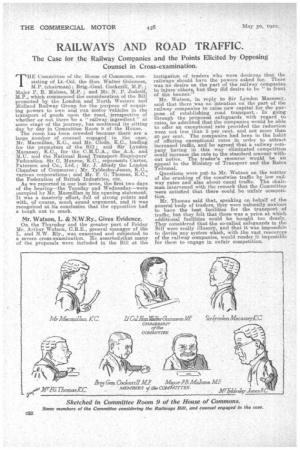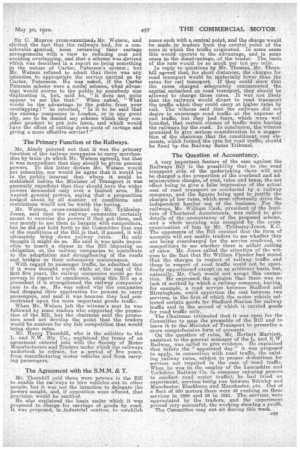RAILWAYS AND ROAD. TRAFFIC.
Page 16

Page 17

If you've noticed an error in this article please click here to report it so we can fix it.
The Case for the Railway Companies and the Points Elicited by Opposing Counsel in Cross-examination.
THE Committee of the House of Commons, consisting of Lt.-Col. the Hon. Walter Guinness, M.P. (chairman); Brig.-Genl, Cockerill, M.P.; Major P. B. Malone, M.P.; and Mr. N. P. Jodrell, M.P., which commenced the consideration of the Bill promoted by the London and North Western and Midland Railway Group for the purpose of acquiring powers to own and run motor -vehicles in the transport of goods upon the road, irrespective of whether or not there be a "railway ingredient " at some stage of the journey, has continued its sitting day by day in Committee Room 9 of the House.
The room has been crowded because there are a large number of counsel engaged in the case, Mr. Macmillan, K.C., and Mr. Clode, K.C., leading for the promoters of the Bill ; and Sir Lynden Macassey, K.C., for the C.M.LT.A., the A.A. and M.T.T. and the National Road Transport Employers' Federation. Sir C. Munroe, K.C., represents Carter, Paterson and Co., Ltd. ; Mr. J. Aibady the London Chamber of Commerce ; Mr. Tyldesley-Jones, K.C., various corporations; and Mr. F. G. Thomas, K.C., the Federation of British Industries, etc.
As we reported in our last issue, the first two days of the hearing—the Tuesday and Wednesday—were occupied by Mr. Macmillan in his opening statement. It was a masterly effort, full of strong points and with, of course, much sound argument, and it was recognized at its conclusion that the opposition had a tough nut to crack.
Mr. Watson, L. & N.W.Ry., Gives Evidence.
On the Thursday and the greater part of Friday Mr. Arthur Watson, C.B.E., general manager of the L. and N.W. Rly., was examined and subjected to a severe cross-examination. He asserted4that many of the proposals were included in the Bill at the instigation of traders who were desirous that the railways should have the powers asked for. There was.no desire on the part of the railway companies to injure others, but they did desire to be "in front of the banner."
Mr. Watson, in reply to Sir Lynden 1dacassey, said that there was no intention on the part of the railway companies to raise new capital for the purpose of establishing road transport.. In going through the proposed safeguards with regard to rates, he admitted that the companies would be able to offer an exceptional rate provided the reduction were not less than 5 per cent, and not more than 40 per cent. The companies had been in the habit of offering exceptional rates in order to attract increased traffic., and he agreed that a railway company having in this way eliminated competition could increase the rate to the standard amount without notice. The trader's recourse would be an appeal to the Ministry of Transport and the Rates Tribunal.
Questions were put to Mr. Watson on the matter of the crushing of the coastwise traffic by low railway rates and also about canal traffic. The chairman intervened with the remark that the Committee were satisfied that there could be unfair competition.
Mr. Thomas said that, speaking on behalf of the general body of traders, they were naturally anxious to have the beet facilities for the transport of traffic, but they felt that there was a price at which additional facilities could be bought too dearly. They considered that the so-called safeguards in the Bill were really illusory, and that it was impossible. to devise any system which, with the vast resources of the railway companies, would render it imposidble for them to engage in unfair competition.
Sir C. Munroe cross-examineds Mr. Watson, and elicited the fact that the railways had,. for a considerable aperiod, been reviewing their cartage arrangements with a view to reducing cost and avoiding overlapping, and that a scheme was devised -which was described in a report as being something in the nature of Carter, Paterson's system ; but Mr. Watson refused to admit that there was any intention to appropriate the service carried on by Carter, Patersona. He was asked, If the Carter Paterson scheme were a model scheme, what advantage would accrue to the public by somebody else duplicating it, but, said he, "it does not quite appear to me like that!' When asked, "What would be the advantage to the public from your overlapping?" he retorted, "Is it to be said that the railway companies in London, or in any great city, are to be denied any scheme which they consider prudentto put into force, and which would have the effect of cutting down costs of cartage and giving a more effective service'"
The Primary Function of the Railways.
Mr. Abady pointed out that it was the primary function of the railway companies, to carry merchandise by train tto which Mr. Watson agreed), but that it was Mexpedient that they should be_gaven general powers. To this latter dictum Mr. Watson would not subscribe, nor would be agree that it would be in the public interest that where it could be stablished before the Minister of Transport it was generally expedient that they should have the wider powers demanded only over a limited area. He wanted general powers, saying that a proposition hedged about by all manner of conditions and restrictions would not be worth the having.
Mr. Watson, cross-examined by Mr. TylelesleyJones, said that the railWay companies certainly meant to exercise the powers if they got them, and not merely to use them to bargain with competitors, but he did not hold forth to the Committee that one of the conditions of the Bill is that, if passed, it will ultimately bring down railway rates. He only thought it might do so. He said it was quite impossible to insert a, clause in the Bill imposing an obligation on the railway companies to contribute to the adaptation and strengthening of the roads and bridges or their subsequent maintenance. With regard to passenger traffic, he admitted that if it wore thought worth while at the end of the first five years, the railway companies would go fele powers in iegard to omnibuses, using this Bill as a preceaent if it strengthened the railway companies' ease to do so. He was asked why the companies had dropped their application for power a to carry passengers, and said it was because they had concentrated upon the more important goods traffic.
When Mr. Watson left the witness's seat he was followed by some traders who supported the promotion of the Bill, but the chairman said the promotern need not develop the point that the traders would be anxious for any fair competition that would bring down rates.
Mr. Henry Thornhill, who is the solicitor to -the L. and N.W. Ely. Co.' explained the terms of an agreement entered intowith the Society of Motor Manufacturers and Traders under which the railways undertook to refrain, for a period of five years, from manufacturing motor vehicles and from carrying passengers.
The Agreement with the S.M.M. & T.
Mr. Thornhill said there were powers in the Bill to enable the railways to hire vehicles out to other people, but it was not the intention to delegate the powers sought, and, if opposition were offered, that provision would be omitted.
He also explained the basis under which it was proposed to charge for carriage of goods by road. It was proposed, in.industrial centres, to establish
zones each with a central point, and the charge would be made to traders from the central point of the zone in which the traffic originated. In some cases this would operate to the advantage,. and in some eases ix) the disadvantage, of the trader. The basis of the rate would be so much per ton per mile.
In reply to questions by Mr. Thomas, Mr. Thornhill agreed that, for short distances, the charges for road transport would be materially lower than the rates for rail transport. If they could show that the rates charged adequately remunerated the capital embarked on road transport, they should be allowed to charge those rates. It was not likely that the railways would divert to road transport the traffic which they could carry at higher aates by rail. The witness said that the railways did not desire to encourage road traffic at the expense of rail traffic, but they had fears, which were well founded, that certain classes of traffic were leaving the railways for the road. In conclusion, the witness promised to give serious consideration to a suggestion of the chairman that the constituent cost elements which formed the rate for road traffic, shoirld be fixed by the Railway Rates Tribunal.
The Question of Accountancy.
A very important feature of the ease against the Railways Bill is the possibility that to the road transport side of the undertaking there will not be charged a due proportion of the overhead and administration charges, of rent, rates and taxes, the net effect being to give a false impression of the actual cost of road transport as conducted by a railway company, and the figures being used to justify the charges of low rates, which must effectually drive the independent haulier out of the business. For the railways, Mr. William Cash, president of the Institute of Chartered Accountants, was called to give details of the accountancy of the proposed scheme, and a whole morning was occupied by the crossexamination of him by Mr. Tylcleeley-Jones, S.C. The opponents of the Bill contend that the form of accounts will not enable traders to see whether they are being overcharged for the service rendered, or competitors to see whether there is unfair cutting of rates. Mr. Jones called the attention of the witness to the fact that Sir William Plender had stated that the charges in respect of railway traffic and those in respect of road traffic could not be specifically apportioned except on an arbitrary basis, but, naturally, Mr. Cash would not accept this contention. He expressed the opinion that there was no lack of method by which a railway company, having, for example, a road service between Stafford and Birmingham, could a.ppertion the cost between two services, in the first of which the motor vehicle collected certain goods for Stafford Station for railway traffic and in the second of which it carried goods for road traffic only.
The Chairman intimated that it was open for the Committee to pass the preamble of the Bill and to leave it to the Minister of Transport to prescribe a more comprehensive form of accounts.
On the question of rates, Mr. Herbert Marriott, assistant to the general manager of the L. and N.W. Railway, was called to give evidence. He explained that before the "appointed day " it was proposed to apply, in connection with road traffic the existing railway rates,. subject to proper deductions for services not required in the case of -road traffic. When he was in the employ of the Lancashire and Yorkshire Railway Co. (a company enjoying powers to conduct road motor traffic), he had tried an experiment, services being run between Biirnley and Manchester, Blackburn and Manchester, etc. Out of a fleet of 500 motors there were 46 running on these services in 1920 and 28 in 1921. The services were appreciated by the traders, and the experiment proved very successful, the working showing a profit. The Committee may not sit during this week.












































